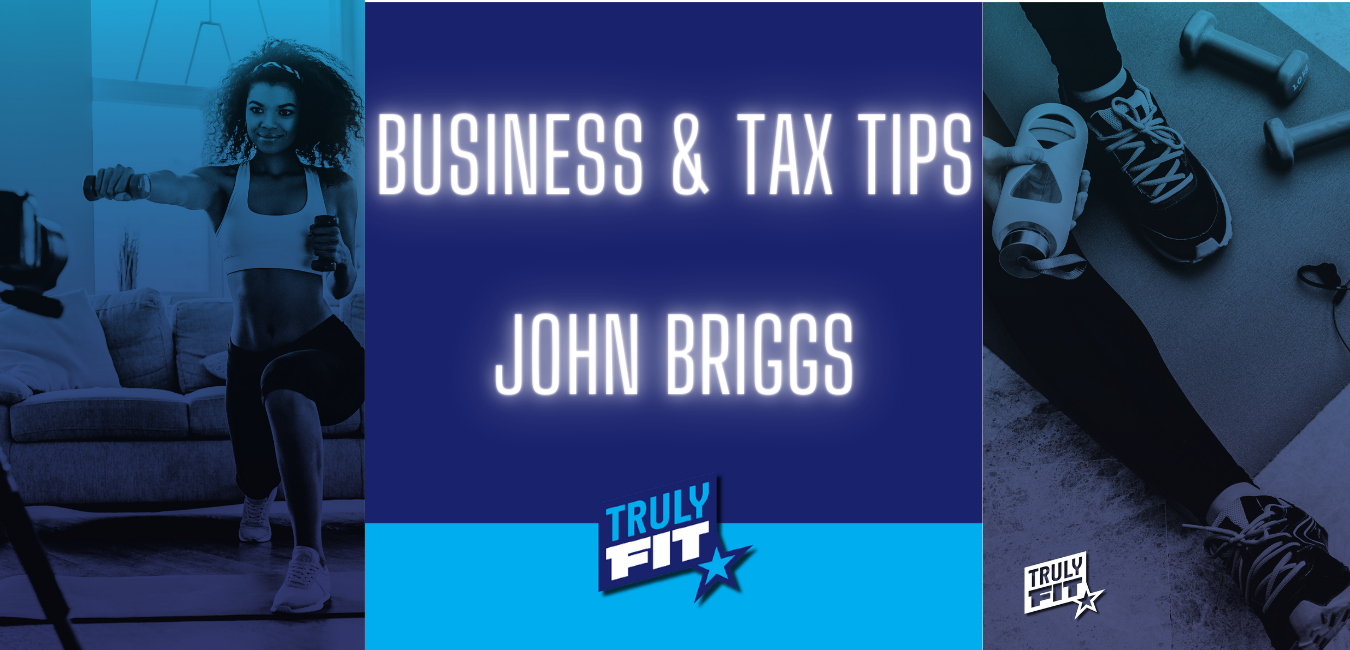
Business & Tax Tips with John Briggs

CLICK FOR AUDIO OF PODCAST
Guest: John Briggs
Release Date: 12/11/2023
Welcome to Trulyfit the online fitness marketplace connecting pros and clients through unique fitness business software.
Steve Washuta : Welcome to Trulyfit. John, thank you so much for joining me truly hip podcast for round two here wanting to get my audience and listeners who didn’t hear you the first time a little insight into pun intended there a little insight into who you are your company and what you do day to day interconnected with the health and wellness industry.
John Briggs : Yeah, so I’m the founder of insight tax and accounting, we currently have about 110 team members. So more a lot more than we have on the first round. Located in Utah, we serve a lot of different service based business, but we have definitely a high concentration over 500 fitness professional clients.
John Briggs : So my day to day is spent a lot of times now helping my team training them, getting them to provide the service that at the standard that I want them to. But yeah, we we love dealing with fitness professionals. For example, I wrote a book Profit First for micro gyms, I owned a gym for three years so that I could understand our clients better. I’m not a very good gym owner, we were really great at managing cash.
John Briggs : But you know, you have to actually mark it really well. And we weren’t good at marketing our gym, so little bit of cash to manage. But yeah, ultimately, I understand my clients a lot better now, though. And that was the goal. But yeah, so that’s a little bit about us.
Steve Washuta : Did you see a hole in the market, as far as that niche was concerned? Obviously, you had you had ran a gym, so that makes you connected with an industry. But did you see like, I feel like gym owners don’t have someone to go to and I need to specialize in this. Um,
John Briggs : we it was interesting, we actually decided to specialize in serving from a tax and accounting need before I got into it. But what happened was, you know, we see the data, and we could see things like you know, or the gyms that seemed the most successful to us. And this isn’t a blanket statement, just in general, had group training, personal training and nutrition is kind of a three legged stool.
John Briggs : And that way, they had three different areas that could bring someone in and then sell them the other two services. Again, we have clients that just do personal training or just to group and you know, some of them work out. But statistically, we saw that and so we would give that data to clients, and they’re like, Oh, that’s great. I’m gonna get this implemented yet.
John Briggs : It just seemed like, Hey, I’m just curious, like, did you implement it? I don’t see any expenses yet that says you’ve tried to do this. And they’re like, Yeah, and so they kind of walked us through some of their challenges, and I didn’t quite understand it until I lived it. I mean, I remember telling Are we the gym that I bought, they didn’t offer personal training at the time. And so when I explained it to them, and a common model that I’ve seen gyms use is what they call the fortnight’s model.
John Briggs : So they get 44% of all the revenue, which was a way better rate for them. They, the pushback I got was very shocking. Like I’m actually offering to pay you more money for the hour of time. And yeah, trying to understand where they were coming from was was super helpful. So I kind of did it reversed. We specialize in it first. And I felt like I needed to understand a little bit better.
Steve Washuta : I do find it confusing gyms that don’t offer personal training, given the percentages that you can take in. And given that, obviously, it’s you can bring in trainers who do the work on your behalf and then take a large percentage, you look at a gym like we don’t have to go into all the details here. But like a planet fitness, who doesn’t really offer that much personal training at all.
Steve Washuta : They’re in the red. I mean, I get that they’re on the NASDAQ but you know, they are there their interest that they’re gaining on all of their debt. I mean, I don’t know how long they’re going to be around. I don’t understand the business model at all, why Jim would not try to push personal training over a $10 membership. Yeah,
John Briggs : and it we have found there’s two kind of distinct models in the space, there’s the I have equipment, I’m gonna rent it. And actually like Planet Fitness, for example. They couldn’t handle all the members if they came in and decided to use their membership.
John Briggs :So part of the allure is it’s so cheap, per month, that it’s actually a bigger hassle for most members to even call and cancel it. versus the other model, which is, hey, we’re gonna give you a lot of focus, and you’re gonna pay more than $10 a month because you’re actually paying for the expertise, not necessarily just renting equipment. Yeah,
Steve Washuta : I call it the hot dog stick. If you buy a pack of hot dogs for $2 on sale, there’s a high likelihood they’re gonna sit in the back of some random Jordan refrigerator and you’re gonna throw it out maybe two months later. If you buy a T bone steak, you’re eating it within 36 hours. Because you spent the money.
Steve Washuta : You know what I’d love to do. I’d love for you to explain all the different acronyms in your industry and what are the differences right that the CPA As a tax specialists and accountant, what exactly is the criteria not only necessarily get the job but the information you’re allowed to give? Yeah. So
John Briggs : from a standpoint of like education and testing, the CPA is the highest level in the industry stands for Certified Public Accountant. The test has changed a little bit from when I took it, and they constantly evolve it, but it’s a little intense and grueling, it’s Yeah. But the joke is because it’s so comprehensive over so many different things that the acronym and R for us stands for can’t pass again.
John Briggs : Because like, really, for me as a tax specialist 15% of the certification and testing related to what we actually do, and there’s a whole bunch of other areas. So from there, then accountant, if someone’s calling them accountant, usually that means they’re a higher level of a professional, they have some more experience. They don’t just do taxes, they likely also do bookkeeping.
John Briggs : You have people who call themselves bookkeepers, they in most cases don’t understand taxes, but sometimes still provide that advice and get clients in trouble. The also from a tax standpoint, you could come across an E AE, which stands for Enrolled Agent. And that’s someone who took a very specific test related to understanding IRS procedures. And because they passed it, the IRS is willing to talk to them on your behalf.
John Briggs : So that’s one of the things as a tax professional CPAs and EAS and licensed attorneys are really the only the main three people who can actually talk to the IRS on the client’s behalf. If it’s just an accountant or a bookkeeper as the taxpayer yourself, you’re you’re gonna have to talk to the IRS. You’re on your own.
Steve Washuta : I’d love to go through a client experience, especially from like a fitness perspective, a gym perspective, right? I come to you, I sit down and say, Hi, John, this is my business. This is my personal I would assume maybe you handle both? These are my assets, so on and so forth. How does that initial meeting go? And what should a professional like myself expect when they’re talking to a professional like you? Yeah,
John Briggs : the first thing I think, to understand is, what is your expectation as the client. We love referrals. In fact, most a lot of firms, the only way they grow is from their current clients referring other people they know. But sometimes that can be an Achilles heel, because the person who did the referring might be have a different level of services or expectation than what you need.
John Briggs : As an example, I have a long term client, we’re doing some urine planning now at the end of the year. And he laid out, he’s like, Hey, here’s a bunch of things that I’m looking to do in the next year. Because we’re doing some changes with our businesses, we’re adding some different ventures.
John Briggs : And he’s like, I need this, this, this and this, and I looked at it, I’m like, Man, this is great. You’re like, this is like an outsourced CFO service, which we have a few professionals who do it. But in his case, we didn’t have any capacity. And like, I appreciate you laying out your expectations. What we can do with the capacity we have is we can still have the year in planning meetings, we can do the tech stuff.
John Briggs :But if you’re wanting weekly meetings, we’re not right now in a position to offer that to you at a quality that we’re going to be happy with. So knowing what you actually want from the professional is really important, because the joke kind of is if you go to bankruptcy attorney and you ask for advice on, you know how to buy a car, they’re going to tell you to file bankruptcy, because everything to them is the nail of bankruptcy, and they’re the hammer.
John Briggs : And accountants tend to have specialties or things are comfortable with I can’t tell you how many times we come across the new client. And he’s like, making a lot of money but doesn’t have the right tax structure. And we say I’m curious if you’ve been using a professional for so long. Why don’t you have say an S corp? Oh, because my accountant said it’s not that necessary. And comes to find out that this guy doesn’t the tax guy doesn’t even file s corpse. He just knows how to file schedule C’s.
John Briggs : So taxpayers overpaying money just because a professional wants to fit the person into what they are capable of doing. And unfortunately, not everyone is upfront and honest as we are with our clients as far as what we can and can’t do or comfortable doing or don’t have experience doing. So manage expectations super important. When you do sit down though, they should be asking you questions like what exactly like they should be helping you pull out the expectation.
John Briggs : What are you looking to get out of the relationship? Where are you looking to go with your business? How do you currently think I can play a role into that? Like why did you want to meet with me in the first place? And then from there, there should be a dialogue because it could go anywhere. way right with depending on their answers. And that dialogue should result in either the client feeling comfortable that this is the person who can help me with what I need. Or maybe they don’t have the experience that’s very relatable
Steve Washuta : to what we do, you know, I might I work best with seniors, I might be working with a 67 year old woman who has COPD and bilateral hip replacements, and maybe she has some movement disorder. And she says, you know, you should work with my grandson, and the grandson contacts me and he’s an eight year old swimmer. And it’s like, well, I just, I can work with them. But I’m gonna have to do my due diligence.
Steve Washuta : This is not my specialty. You guys are so far apart that it’s best for me to just say, let me find someone else I can help you find someone else who’s better suited for him. But the problem is, when you’re new to the industry, you want all the work you can get. So you have to watch that out, I’m sure with tax professionals, right are certified accountants, maybe they just opened up and they said, well, I’ll just take on anybody because I need anybody, even if I don’t specialize in it. Okay,
John Briggs : I’ve been there Guilty as charged. But when I first started, I left the firm I was with because they hadn’t paid me for six months. And I needed to put food on the table. And so I called myself, I mean, I joked about it with people, but like I was basically a prostitute. Like, I doesn’t matter what you do, how much are you willing to pay? Here’s my fees. That’s too expensive. Okay, what will you pay? Like, I just needed clients, I needed money coming in. And yeah, it wasn’t the great thing.
John Briggs : Great thing, because then now I made my own bed. And I, it took probably three years to cycle out really bad clients from the standpoint bad in the sense that we were not a match for each other. Sure. We’re not bad people. It’s just what they were looking for. And what ultimately I was hoping to provide. Just we were not meshing very well. But it took like three years. And guess what the people you end up hiring, often refer people like them to you.
John Briggs : And so if I have a bunch of people who are the only thing they’re interested in is the cheapest price possible. That’s not the quiet. That’s not the client base that ultimately, I wanted. And, yeah, so it took a little bit time to sort through that.
Steve Washuta : Can you talk about why weekly book, bookkeeping is so important? Let me give you a scenario. Maybe someone’s a personal trainer, they work at a few different gyms, they work out of their house, but they charge everything to their business account, they have an LLC that they created on their own, they charge everything to some particular business account, and they go well, at the end of the year, I’ll just print it all out, hand it to John, why do I need to book you.
John Briggs : I mean, one, if you hand your bank statements to an accountant at the end of the year, they likely are going to charge you, they should be charging you to compile all that information, because the bookkeeping itself, or the bank statements itself and having the one account, all that is is a history of each transaction.
John Briggs : But that doesn’t tell us based on IRS rules who for the record, if you’re audited, that’s the very first thing they will get, whether you give it to them or not, they will have the ability to go to the bank and get the bank statements. So they will see your bank statements, and they’re going to build their own report based on no knowledge whatsoever of your business or the transactions, and they’re going to build it in a way that’s favorable to them, meaning every deposit is going to be income, and every expense is likely going to be not an expense.
John Briggs : So that’s one reason you, you, you if you don’t have bookkeeping, you’re, you’re running the risk that they’re gonna audit you and they’re going to frickin come up with their own stupid outcome of what it looks like. So then it becomes alright. I should do my own categorization of these different transactions because I was short on cash but interface of bills. So I personally put money into the gym.
John Briggs : Okay, that’s an income. But the bank, the bank statement shows the deposit or I bought some new equipment. Well, there is a big deposit that came in, not income, because that’s a loan. classifying them the right way will help you save taxes, because if you don’t, we see it all the time, misclassification in books done by the owner or the owner, spouse, or my favorite, a member that we’re trading services with, they kind of dabble in QuickBooks, and they’re doing my books.
John Briggs : You don’t want to overpay in taxes. And then the third reason I would say why you want to do it. If you account for it the right way, it creates basically a journal a history of what your business did. And there’s a reason history is a thing in the world. There’s a reason we talk about past wars and past things that happened because we can learn from the past. It’s no different with the history that your bookkeeping reports for you.
John Briggs : Because then you can look at it and say, Oh, it looks like the history is saying I was trending in one direction and then changed. Anything that raises like a there’s a change here. That should lead the owner to ask questions like, why did it change? And was a change good or bad? Regardless, I want an answer to why a change and if it was good, I want to do more of that. It was bad. I want to stop doing whatever it was. So it reports the history, but it leads us to ask really good questions that make our business better going forward.
Steve Washuta : You just mentioned a few of the examples. But can you talk a little bit more about as far as the health and fitness industry is concerned? What people typically are more likely to screw up what you see kind of time and time again, that seems like an easy fix if they had somebody like you?
John Briggs : Yeah. I mean, the first thing that comes to mind is the dues and subscriptions. gym owners tend, we tend to see a lot of different subscriptions to certain things. And then as we sit down with them and have them analyze the different vendors, they realize there’s a lot of crossover and the different things that they’re paying for. And they can usually get rid of some, if not most of those things, realizing I’m not paying for that bells and whistles anymore.
John Briggs : Anyways, I didn’t need that looks like this one subscription set of these five will actually accomplish the same thing that I want. As far as bookkeeping goes, Yeah, it’s pretty common for us to see someone misclassified and putting money into the business personally, or they don’t know how to classify a loan, purchase the right way, and they end up inflating their income, and expensing it the wrong way on the books, which would be a problem if the IRS ever caught them. And those are the main ones that we see.
Steve Washuta : This might be outside of your wheelhouse and feel free to say if it is, might be more of like a certified financial planner or something. I know, we tried to talk through all the acronyms but as far as borrowing money from your business, is that always a bad idea to borrow money from your business? If you have a lot of equity in your business, and you need to take a loan, whether it’s personal or otherwise?
John Briggs : Yeah, and I think you were mentioning Elon Musk’s example, right? Yes. Elon doesn’t pay himself a salary because his compensation is awarded to him and shares. Now. Yeah, there’s for small businesses, which is not Elon. The reason this works for Elon is because his business is large enough that what he’s actually borrowing against, it’s, the bank does the underwriting and they say your business is worth this much we’re willing to lend to you based on that value, we are not going to have that opportunity as small business owners, where a bank is going to say your company is worth X amount.
John Briggs : The problem is is I mean, most of us, in fact, I haven’t had a client who went public, we don’t deal with clients who go public. Going public allows people to share their equity back and forth. So there’s a liquid market, we’re considered private. And so our equity value is illiquid. So banks not gonna lend to us on that. Because if something goes down, they don’t really have the ability to turn around and sell the collateral. borrowing against the business, generally, for small business owner is not recommended.
John Briggs : The reason being if you’re audited, the IRS is going to expect to see a loan agreement, and they’re going to expect it to be treated as an arm’s length transaction, meaning, if you borrowed money from someone else, what would that relationship look like, you’re gonna have monthly payments, you’re gonna have interest expense. Well, most business owners don’t do that. Now, and so we don’t recommend it. And the main reason is because it, we don’t need to do it. As the owner of a small business, you have the ability to take money out of the company whenever you want. And you just call that a distribution.
John Briggs : So distribution, shareholder, draw, owner’s draw. All of those refer to the exact same thing. There’s money in the bank, the business bank account, and you pull it out as an owner. And you classify it that way under equity. If you need to put money back in it’s an owner’s contribution, which is also an equity account. None of it affects your taxable income. And just like taking out a loan wouldn’t affect your affect your taxable income. So instead of complicating it with an official loan, we just say, if there’s money there to take out, take out.
Steve Washuta : It appears the IRS is growing. I know that they’re there even maybe the things that are involved with the scope, the breadth of what they have to do seems to be larger. Are you concerned with that doesn’t seem like it based upon your shirt? Are you what and why? Why is it that that they’re growing? Do they actually need to grow as far as the bandwidth is concerned? Is this just government bloat? Well,
John Briggs : I think everything’s government bloat, so I think they really suck at spending our money. I’m not a fan of entitlement programs. There’s no evidence that shows that benefit anything other than buying votes, which I think is disgusting. I think though, what we have to do is backtrack back in 2018. President Trump passed the largest tax reform that had happened since basically the inception of the tax code back in 1913.
John Briggs : And it changed a lot of things. And one of those things that he did was As massively decreased the IRS budget and put freezing on IRS hires. And so they actually shrunk. So for the last five years, we’ve enjoyed an understaffed IRS. Now, I wasn’t in love with the Biden administration’s law passing in the billions that they’re allocating. But the good news is, is what they’ve allocated, is supposed to be tranches, meaning it’s going to be given incrementally over a series of years, it will likely still take probably three to four years to even get back to 2018, IRS employee levels.
John Briggs : So it does they are growing, but it’s really fixing kind of the cut that Trump did. So we’re right now it’s not, I don’t feel like it’s bloated, especially as professional we would call in, they’re still understaffed, like, we wait on hold for hours. And that’s with us having a special hotline, as a CPA firm. Sure. I don’t even know what taxpayers what kind of hole they end up getting, if they ever tried to call them. But that being said, they’re always going to try to overreach, one of the reasons I liked the text field is, as a child, I was bullied. And so that caused some issues that I had to work through.
John Briggs : Found out even later in life, even as an employee, I had a hard time firing people. And it routed back to the fact that I was bullied as a child because I wanted people’s approval. And so I actually view the IRS and the entity of the IRS as one of the most empowered bullies that has free rein to do a lot of stuff. And so we get a lot of passion out of protecting taxpayer. So anyone listening, I just want you to know that if you ever get a letter from the IRS, there’s a high likelihood probably above 80%, that that letter is not correct. If they’re asking you to pay money, chances are it’s not the right amount.
John Briggs : Not saying you may not owe some money, but there’s ways and they just, I think they have a plan. They send out letters to people knowing that a high percentage of taxpayers just pay it, because they don’t want to deal with the scary I get it my heart rate increases when I open IRS are like oh, no, what’s this going to be? So I get it, and we deal with them all the time. And I’m comfortable with the language of the letters and how to deal with them. I can’t even imagine what a normal taxpayer feels. But yeah, don’t always get advice from a professional if the IRS is reaching out to you because you want someone to protect you. Because without that protection, they will bully.
Steve Washuta : What is a major red flag that you know of? Where the IRS is more likely to come after you like I’m sure they’ve compiled right stats where they take like, hey, the IRS, these 100 people that came after they looked at all of their returns and saw that there was one or two particular things in that return, what could that be,
John Briggs : um, one of the biggest ones, which if you have a good tax professional won’t happen is having a personal return that has a Schedule C business reported on it, that has a loss. Like the last stat I saw was something like, of the people who get audited, above 90% of them had a Schedule C with a loss on the tax return. If you’re because sometimes it’s great if I have like a lifestyle business, and I have income coming in.
John Briggs : And I can expense a lot of part of my life, I sometimes don’t pay any tax on actually getting income and being able to expense things that I really would have spent money on. That’s great. And it works really well until you want to try to sell your business. And that’s a different story. But the way that looks want to return is that I have a business activity that doesn’t have a loss. But I like potentially, a lot of our clients we’ve seen also have a W two job outside of the fitness business, or their spouse does.
John Briggs : So high w two, Schedule C loss, that’s a problem. But with a good tax professional, you should have a better entity structure than filing your business activity directly on your personal tax return. And that likely is going to be an S corp. But again, I would recommend meeting with a professional to make sure that’s the right structure for you. But a separate entity filing gets filed at a totally different location. With the IRS. It’s a different department different state usually.
John Briggs : And the different departments with the IRS don’t talk well with each other. So you avoid some of the scrutiny on that’s the number one red flag. The second one that often comes up is this idea of hey, I have an office on my house. And I know I can get a tax deduction for that. So the IRS has a forum called business use of home. That form was created so that they can raise awareness to the IRS of who they should audit. Because based on the rules itself, if you take one personal call in the space that you’ve designated as your office space, the IRS would say it’s null and void and you don’t get the benefit anymore.
John Briggs : Like are you kidding me? Like who’s paying attention that much and they know that everyone does personal things in their office space. So using the business use of home form is not a good idea. We actually recommend a tax strategy called Corporate rent, also known as the Augusta rule, if you Google that you’ll get a whole bunch of material are you go to our blog, we’ve written on it before, happy to talk about it if you want, but it’s a much better strategy of using your home to reduce taxes and filing a Form that really doesn’t give you that good of a tax benefit and massively raises the awareness to be audited.
Steve Washuta : Sure, well, let’s actually talk about both of them. Well, we’ll come back to the corporate rat in a second, I want to go back to the original statement you made. So let me give you like an example. And then you can kind of break that down. You have, you know, a husband, who works, just a regular office job, and he works in marketing. And then the wife has a scheduled C yoga business, and she’s not successful. It’s year one, she bought more stuff that she had clients, if they filed together, and she reports a loss on that business. But together, they’re still net positive because of his money, they’re still more likely to be audited, even though even though they’re net positive together.
John Briggs : Yeah. And because you want them to file together married filing jointly, is the best tax bracket, you can have married filing separately is one of the worst. So you would want to file together but yeah, his high w two income and her schedule C business that runs at a loss would increase their audit risk. Interesting.
Steve Washuta : And then going back to the the corporate run, how exactly does one implement that over just writing the square footage of their office? Yeah,
John Briggs : so if I write off the square footage of my office, call it 150 200, even 300 square foot room, right? Divide that by the total square footage of my house, most people are in a 10 to 15% range. So theoretically, now they can write off 10 to 15% of the different home expenses, including mortgage interest, property taxes, which for record you already get anyways with if you itemize.
John Briggs : So you don’t necessarily need like, you’re already going to get 100% of that if you itemize that but then utilities, if I do any repairs, maybe potentially I can get some of that. For most people, you’re talking 2000 $3,000 At most of an expense. And again, it raises your chance of audit. The corporate rent strategy, also known as the Augusta rule, is based on this idea in Augusta, Georgia every year they have the Masters tournament for golf.
John Briggs : And there’s a lot of wealthy people in Augusta it’s a very wealthy town, wealthy people, no law, no lobbyists, and they kind of pushed this really cool tax strategy for all of us. Because people come in to Augusta. It’s limited on hotel space. So they’re like, Wow, I can rent out my house for five to 10 grand a night to these guys coming in town for the Masters tournament, which happens to be about 10 days ish.
John Briggs : Depending on, you know, if the golfer on their team. I want to make money there. But I don’t want to be tax on it. So what can we do? So there’s a rule in the tax code that says a rental property is defined as a rental property once it’s rented for more than 14 days, more than 14 days, which means if I have a property, and I rent it for less than 14 days, it’s not a rental activity based on tax law. Which means any income I get off of that property is not rental income, because it’s not a rental property.
John Briggs : We have that rule. And then we compare that with large businesses will rent places like hotels and convention centers to hold company meetings. And we just say let’s have the small business owner do this. And let’s combine these two rules. So the business so you have to have a separate business entity for this to work the separate business entity rents from you as the individual your living space one day per month.
John Briggs : So you’re 12 days out of the year, under 14, your business gets a rent expense, because that’s what most businesses do anyway, so it’s accepted to provable thing. But on the flip side, when I pass that money to me personally, I don’t have to pick that income up anywhere. It’s not income anywhere, it doesn’t show up on my return anywhere, because the rules say I don’t have to report it anywhere. And so we have found nationwide, US $1,250 is a standard day rent that like if you went to a hotel and asked for quotes, you’re likely going to be in that range.
John Briggs : If you live in a more expensive area, we recommend people going to like a short term rental website and finding a property similar in size similar in geographic area to find a higher rent than the 1250 but 1250 a month works pretty great. $15,000 a year in rent expense. So that’s it Like a $6,000 tax savings, where the other one increases your chance of audit and gives you a $3,000 expense, which might save you 1000 bucks. So that’s why we really liked that rule.
Steve Washuta : That’s amazing. Combining two rules to then not not only get the benefit of one rule, but really just create its own sort of, you know, you’re weaving two things together that creates its own benefit. Yeah. So we talked about the red flags, for the for the fitness stuff, which is really important. But I think one thing I have seen recently is that there’s so many people accepting electronic payments.
Steve Washuta : There’s Venmo, there’s Zell, there’s things I’ve never heard of. And I know that personal trainers, a lot of times we’ll have a non business related Venmo, right? Just might it’s just your name, you know, Sally Smith, and their client finds them and they want to pay them for the session and send them there. How do you kind of avoid that disaster because I imagine the IRS is also looking into this.
John Briggs : Yeah, luckily, they haven’t found a good solution yet other than, you know, if they can come across the fact that you have Venmo, or one of those types of things, they’re gonna want reports on it. And I know why people do it. If you say you’re a business on Venmo, now you got to pay money, versus a, Hey, this is just a transaction between people. And they don’t charge you for that. If, first of all, if you’re doing that, please at least report the income, I get it. Like, you could technically hide it.
John Briggs : And if you hide it, the IRS is gonna have a hard time seeing any sort of transactions that result in it, because it’s more common. If they find it, and you hit it, you’re in big trouble. Because that now constitutes an act of fraud. And they can open up a lot more years to audit you. So just report it. If you don’t want to pay the money for a Venmo account, for example, at least print off. You might have to do screenshots. I, because I have a Venmo account, I’m not sure there’s a way to like print off or have something emailed to you have a list of that year’s transactions, I think you have to, like literally screenshot it, which sounds like a massive pain in the butt.
John Briggs : So I, I feel like if you’re gonna go that route, you’re gonna get the convenience of it. You definitely at least you got to take screenshots so that you have record of what was considered client income and what was actually personal. Because they are they’re going to find it and they will be able to get all that data themselves. If PayPal is as convenient. PayPal is a little bit nicer, because you can export things and save records that way.
John Briggs : Yeah, but ultimately, I don’t have an issue or qualms if someone is deciding to take payment that way, for convenience, I do think based on the size of your business, it is worth looking at the element of how professional don’t want to appear. receiving payments on Venmo is not as professional as just saying I have a merchant account.
John Briggs : And yeah, you pay two or 3% depending on who you sign up with. But a lot of times that’s also as convenient for people especially now you get them on a recurring thing, you signed up a thing and until you cancel it’s a recurring membership versus waiting for them to initiate the Venmo payment.
Steve Washuta : That’sa great point. Fantastic information. John, as usual, point us in the direction to find your business for any personal trainers or health professionals who are looking to use your services or look deeper into your company inside tax.
John Briggs : Yeah, so insight tax.com is a great way to go. And it’s spelled a little bit differently because it’s the word insight as to an insight a riot. Because it technically means to cause to action. So it’s I NCITE tx.com Check out our blog we we do a lot of the stuff we talked about,
John Briggs : we go into more detail. In our blog talking about things like paying your kids we have lots of free strategies for you to look and learn about on our website. If you’re interested in cash flow management, I also wrote the book. So the website you can find details on his profit first for micro gyms.com. Both are great tools. We try to give as much resources to gym owners as possible.
Steve Washuta: Thanks for joining us on the Trulyfit podcast. Please subscribe, rate, and review on your listening platform. Feel free to email us as we’d love to hear from you.
Thanks again!

CLICK FOR AUDIO OF PODCAST




